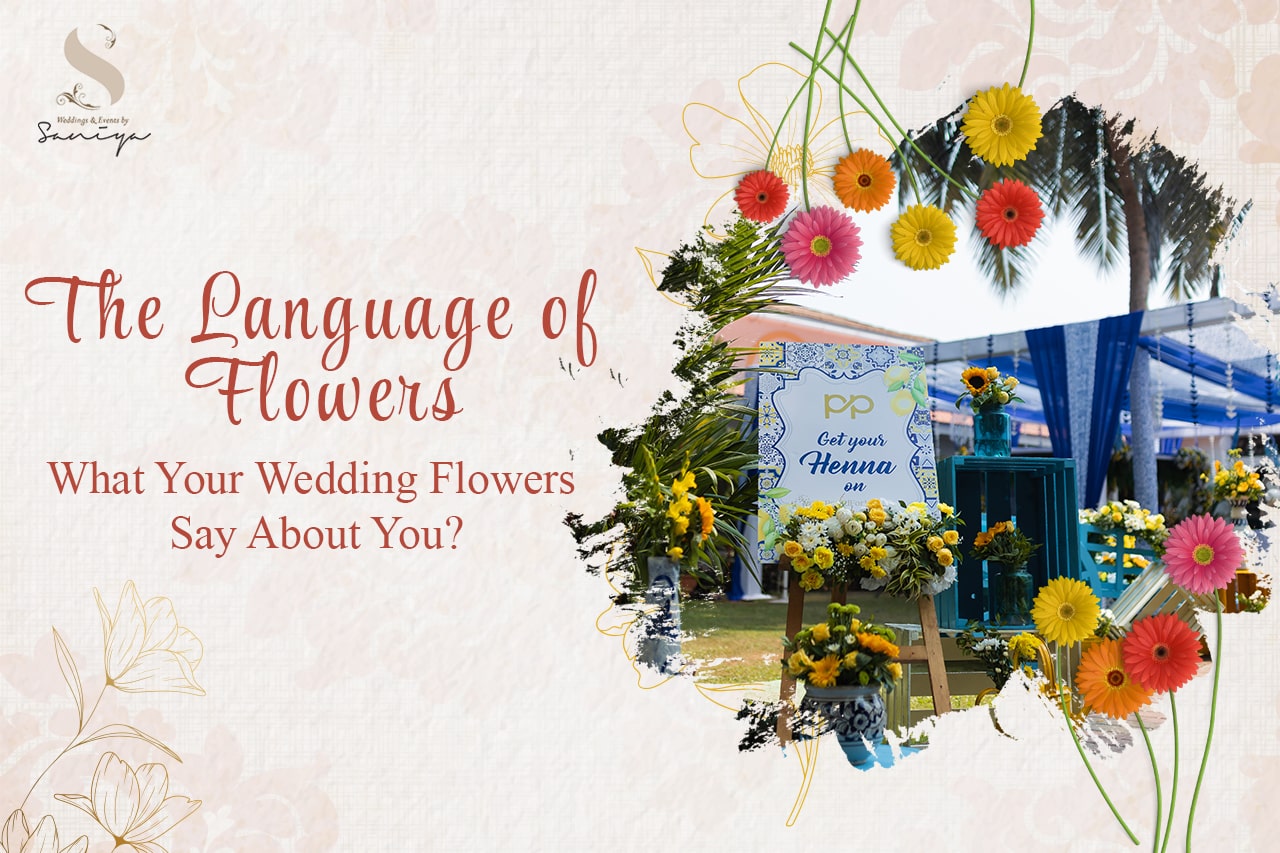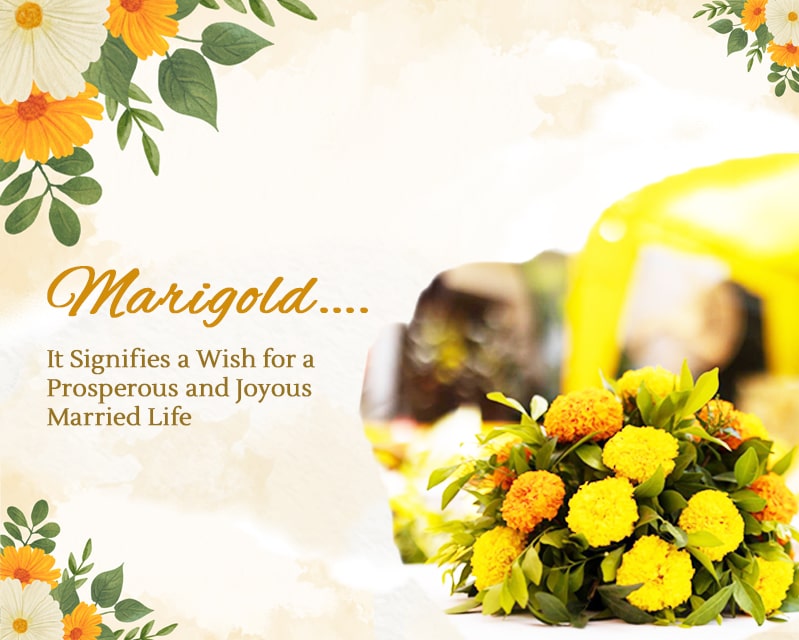
10 Aug The Language of Flowers: What Your Wedding Flowers Say About You?
“Language of flowers is a universal language of love, affection, and emotions,” says EBS. Especially at weddings, they hold a special significance as they add beauty to the celebration and convey unspoken messages and sentiments. Each flower has a unique symbolic value, enabling couples to add personal touches and heartfelt sentiments to their wedding. Every floral choice, from the bride’s bouquet to the table centerpieces, may reveal a lot about the couple’s personality, feelings, and level of love.
By understanding the meaning behind the florals you choose, you can create a wedding that beautifully expresses your unique love story through the artistry of nature’s most exquisite gifts. In this article, let’s delve into the enchanting world of “The Language of Flowers” and explore what your wedding flowers say about you as a couple. Let’s uncover the hidden messages behind roses, the most beloved flower of all, and how they speak the language of flowers with their elegance and romance.
Discover each wedding flower’s significance and meanings, from timeless classics to modern floral arrangements. Whether you embrace a traditional wedding flower theme or opt for a more personalized approach, let the flowers for your marriage become the vibrant storytellers of your special day. Let your wedding flower theme reflect your love, with every petal and blossom representing the essence of your relationship. As you choose the type of flowers for your wedding, consider their deeper meanings and sentiments. Let the language of flowers enrich your wedding day with beauty, symbolism, and a touch of magic.
In every wedding, each detail is carefully looked after to reflect the couple’s personalities, aspirations, and cultural heritage. Every component has meaning and a purpose, from the clothing to the decor. Among these factors, flowers have significance for mood and expressing feelings. The flowers chosen for a wedding speak a message in the colorful tapestry of any wedding.
Language of Flowers and Importance of Wedding Flower
Every flower symbolizes some value and has meaning commonly used in weddings. Just like words have the power to communicate feelings, flowers have their own silent yet profound way of expressing emotions, wishes, and intentions. Understanding this language of flowers allows couples to curate their wedding floral arrangements with purpose, bringing more profound significance to their special day.
Whether it’s the radiant marigolds evoking joy and prosperity, the delicate jasmine symbolizing purity and sensuality, or the enchanting lotus representing divine beauty and spiritual awakening, each flower choice tells a unique story about the couple, their culture and their love. By delving into the meanings of these flowers, couples can personalize their wedding floral arrangements to reflect their personalities, convey heartfelt emotions, and create an ambiance that resonates with their love story.
Unique Flowers and What They Symbolize on Your Wedding
We will take you through the diverse and captivating world of wedding flowers and what they symbolize in different cultures. Explore the significance of roses, marigolds, lotus, jasmine, and many more, unraveling their hidden messages and learn more about the language of flowers. Discover how choosing flowers can bring auspiciousness, joy, and blessings to your wedding ceremony while infusing it with beauty, grace, and cultural richness.
Whether you’re a bride looking for the perfect blooms to reflect your innermost desires or a groom seeking to make a meaningful statement through flowers, this article will guide you in understanding the language of flowers through Indian wedding culture. Immerse yourself in the enchanting world of petals and fragrances, and let your wedding flowers speak volumes about your love, dreams, and the beautiful journey ahead.
1. Rose:
Roses are universally known as the symbol of love and beauty. In an Indian wedding, roses signify a strong bond and connection between the couple. Red roses symbolize passionate and enduring love, while pink flowers express grace, adoration, and pleasure. White roses are standard for wedding ceremonies because they represent innocence, purity, and the beginning of something new.

2. Marigold:
Especially in Indian culture, marigolds have a unique position and are commonly used in holidays and celebrations. Their vibrant golden color is believed to attract positive energy and symbolize prosperity and good fortune. Including marigolds in your wedding decorations and garlands signifies a wish for a prosperous and joyous married life.

3. Jasmine:
Jasmine is known for its delicate beauty and enchanting fragrance. In Indian weddings, jasmine flowers are commonly used in the bride’s hair and garlands. Jasmine symbolizes purity, sensuality, and the blossoming of love. Its pleasant aroma is believed to offer the couple luck and happiness.
4. Orchid:
Exotic orchids symbolize richness, beauty, and power. Orchids enhance wedding décor with exquisite and beautiful flowers, which are both elegant and sophisticated. White orchids represent elegance, innocence, and purity, while purple symbolizes royalty, appreciation, and respect.
5. Lotus:
In Indian tradition, the lotus flower has great spiritual importance and tends to be related to enlightenment, purity, and heavenly beauty. It symbolizes the journey of the soul and the attainment of spiritual consciousness. Including lotus flowers in your wedding decor symbolizes the sacredness of the union, purity of intentions, and the blossoming of love.
6. Carnation:
Carnations can be found in many colors, each with its value. Red carnations represent deep love, admiration, and affection. White carnations signify purity, luck, and innocence. Pink carnations convey gratitude, motherly love, and appreciation. By choosing carnations as part of your wedding flowers, you can express your heartfelt emotions and sentiments to your loved ones.

7. Sunflower:
Sunflowers are lively and vibrant flowers that stand for joy, warmth, and optimism. They stand for admiration, devotion, and strength. Sunflowers bring joy and radiance to wedding decorations, reflecting a vibrant and lively personality.

8. Lily:
Lilies are beautiful, majestic flowers with many symbolic meanings depending on their color. White lilies are symbolic of innocence, virtue, and purity of love. Pink lilies symbolize prosperity, abundance, and aspirations. Orange lilies convey confidence, pride, and passion. Including lilies in your wedding flowers adds an element of grace, refinement, and sophistication to the overall ambiance.

9. Rajnigandha (Tuberose):
Rajnigandha, also referred to as tuberose, is a fragrant flower for elegance, sensuality, and enduring love. It is often used in wedding bouquets, garlands, and decor, infusing the surroundings with its captivating fragrance and adding a touch of romance to the ambiance.
10. Parijat (Night-Flowering Jasmine):
Parijat is a one-of-a-kind flower that blooms at night and has a distinct aroma. It is associated with beauty, love, and transcendence. Parijat flowers are considered auspicious and are often used in wedding ceremonies and decorations, symbolizing eternal love and divine blessings.
To Conclude:
Including these Indian flowers in your wedding floral arrangements allows you to embrace the rich cultural traditions and symbolism associated with them. Each flower brings unique charm and meaning, creating a visually stunning and emotionally significant atmosphere for your special day.
By understanding the symbolism and meanings behind these flowers, you can carefully select and curate your wedding floral arrangements to reflect your unique personality, convey heartfelt emotions, and enhance the overall atmosphere of your special day. So, when you go to a wedding in the future, ask:
- What does this flower have to say?
- Does it express love? Sincerity? Beauty?
- Did those flowers leave an impression on you?
Frequently Asked Questions
Q1. What is the most gifted flower?
The rose is often considered the most gifted flower worldwide. Roses are a standard option for many events, particularly when expressing romantic thoughts since they have long been revered as a symbol of love, beauty, and loyalty. Different colored roses can convey other emotions, with red roses being the most commonly gifted to signify love and passion.
Q2. What flower attracts love?
The peony is believed to attract love and romance. Peonies are symbolic of wealth, luck, and successful marriage in many cultures. They are often used in wedding floral arrangements to symbolize a happy and harmonious union. Peonies are popular among people seeking to strengthen love and devotion due to their rich blooms and exquisite aromas.
Q3. What are the best Indian wedding colors?
In Indian weddings, vibrant and auspicious colors often create a festive and joyous atmosphere. Some of the best Indian wedding colors include:
- Red: Considered the most auspicious color, red symbolizes love, passion, and prosperity. It is extensively used in bridal apparel and decorations.
- Gold: Associated with wealth and luxury, gold is a prominent color in Indian weddings, adding a regal touch to the celebrations.
- Green: Representing fertility, growth, and harmony, green is commonly used in floral arrangements and decorations.
- Pink: Symbolizing love and celebration, various shades of pink are famous for wedding attire and décor choices.
- Orange: Signifying enthusiasm and energy, orange is often used to add vibrancy and liveliness to the festivities.
- Yellow: Representing happiness and new beginnings, yellow brings positivity and joy to wedding celebrations.
Q4. What is the psychology of flowers?
The psychology of flowers, or “floriography,” explores flowers’ emotional and psychological impact on human behavior and emotions. Different flowers are believed to carry distinct meanings and can evoke specific feelings in individuals. For example, getting flowers may increase good feelings, ease tension, and build a sense of appreciation and connection. Flowers’ colors, scents, and symbolism can influence moods and reactions, making them powerful tools for expressing emotions and communicating non-verbally.
